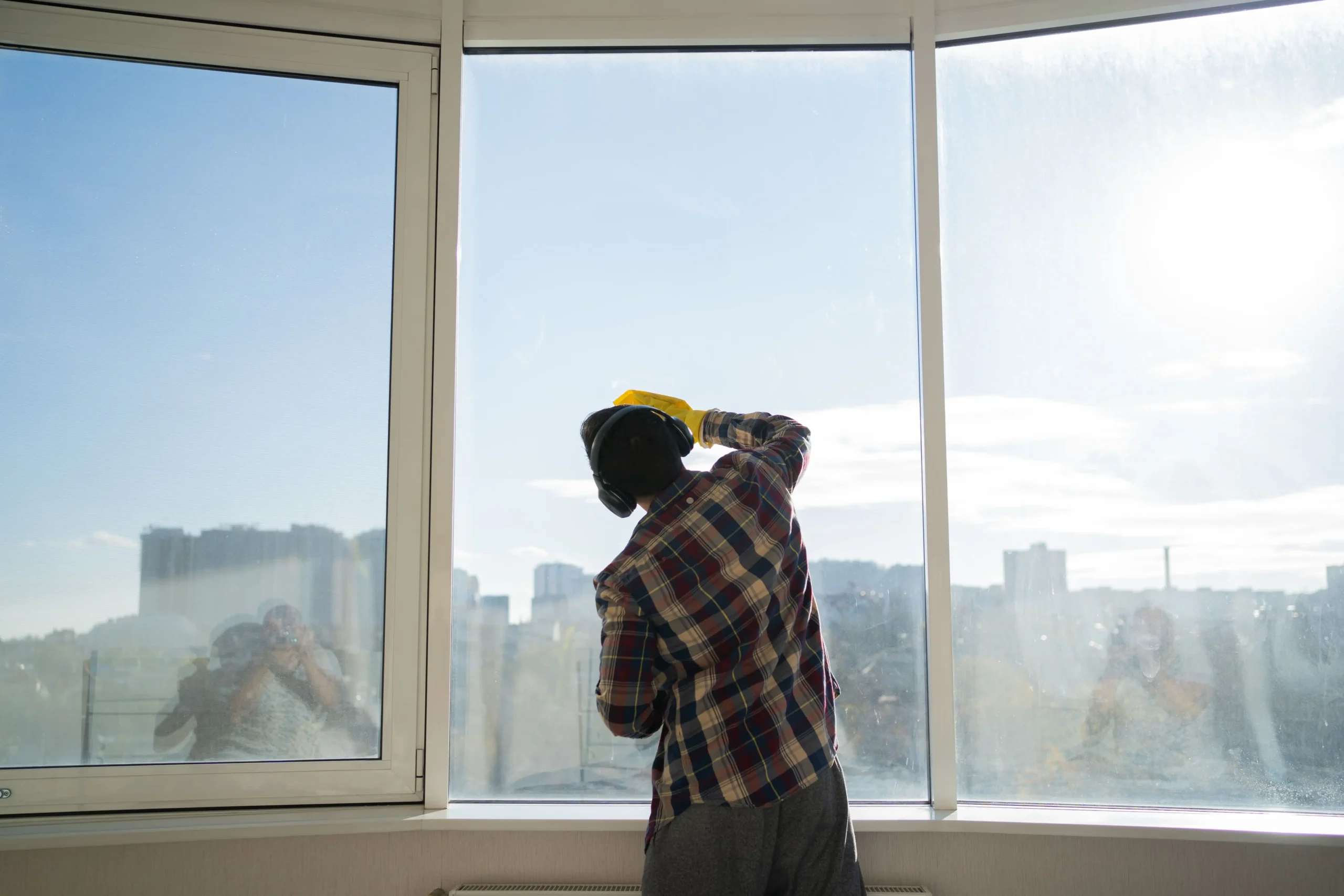When it comes to safeguarding your home’s windows, window protection film is an effective and affordable solution. Not only does it enhance the privacy of your living space, but it also offers numerous other benefits like UV protection, glare reduction, and even enhanced security. If you’ve been considering residential window tinting or privacy window film, this article will guide you through the advantages, types, and installation process of window protection film. We will also explore how window tint for house windows and other window films can provide value to your home.
What is Window Protection Film?
Window protection film is a clear, thin layer of material that adheres to the surface of your windows, offering a wide range of benefits. This film can be used in both residential and commercial settings to improve window durability, protect against shattering, reduce UV exposure, and enhance privacy.
Unlike traditional window treatments such as blinds or curtains, privacy window film allows you to maintain the aesthetic of your windows while offering protection. The film works by adding a protective layer that helps absorb and disperse the impact of physical damage, preventing cracks and shattering.
What Are the Different Types of Window Protection Film?
There are several types of window protection film available on the market, each designed for different needs. The primary types include:
Safety and Security Window Film: This type of privacy window film is designed to prevent windows from shattering upon impact. It is ideal for enhancing the security of your home, especially in areas prone to storms or break-ins. By holding the glass together in case of impact, it prevents glass shards from scattering and potentially causing injury.
UV Protection Window Film: UV protection films, often used in conjunction with residential window tinting, help block harmful ultraviolet rays that can damage your skin, furniture, and flooring. These films are ideal for homeowners who want to protect their interiors while still enjoying natural sunlight. This type of film provides protection against UV rays without darkening the window.
Decorative and Privacy Window Film: Privacy glass film or privacy tint for home windows is designed to reduce visibility from the outside, providing an extra layer of privacy. This type of film comes in various styles, from frosted and etched designs to mirrored finishes. It’s an excellent solution for homes that require more discretion, like bathrooms or bedrooms.
Reflective Window Film: Window tint film for home is often reflective, especially when used for privacy. It helps regulate temperature by reflecting heat, thus improving the energy efficiency of your home. It can also help reduce glare from the sun, making it easier to see through windows without being blinded by bright sunlight.
How Does Window Protection Film Work?
Window protection film works by adhering to the surface of your windows, creating a shield that enhances the window’s physical properties. Depending on the type of film, it can either provide UV protection, improve security, or increase privacy.
The film is typically made from polyester and is coated with a layer of adhesive that bonds it to the glass surface. This makes it easy to apply and remove without leaving any residue behind. The thickness of the film varies depending on its purpose—thicker films are used for safety and security, while thinner films are used for UV protection and decorative purposes.
In the case of residential window tinting or privacy window film, the film reduces the amount of visible light that passes through the glass, giving you greater control over the lighting and temperature inside your home. Privacy tint for home windows also blocks the view from outside, allowing you to maintain a high level of privacy while still enjoying the benefits of natural light.
What Are the Benefits of Window Protection Film?
There are several benefits to installing window protection film on your home’s windows, ranging from enhanced privacy to energy savings. Some of the primary advantages include:
Enhanced Privacy
One of the main reasons homeowners choose window protection film is for the added privacy it provides. Privacy window film and privacy glass film effectively obscure the view from the outside while still allowing light to filter through. This is especially beneficial for areas like bedrooms, bathrooms, or any room with windows facing busy streets or close neighbors.
With privacy tint for home windows, you can enjoy increased privacy during the day while still maintaining a bright and airy atmosphere indoors.
Protection from UV Rays
UV protection window film helps block up to 99% of harmful UV rays, which can cause skin damage and accelerate the fading of furniture, artwork, and flooring. By applying window protection film, you can preserve the interior of your home while enjoying the sunlight without worrying about harmful radiation.
Energy Efficiency
One of the key benefits of window tint for house windows is its ability to improve your home’s energy efficiency. Reflective window tint film for home helps reflect heat away during the hot months, keeping your home cooler and reducing the need for air conditioning. In colder months, it can also help keep heat inside, reducing your heating costs.
Improved Security
Window protection film is an excellent choice for increasing your home’s security. It can make windows more resistant to breaking, preventing potential burglars from easily gaining access. If your windows are impacted by storms, the film helps hold the glass together, reducing the risk of injury from shattered glass.
Glare Reduction
Another benefit of privacy window film or window tinting is the reduction of glare from the sun. This can improve your comfort by eliminating the harsh sunlight that makes it difficult to watch TV, work on your computer, or relax in your living room. Glare reduction makes for a more enjoyable living space, especially in rooms with large windows.
How Can I Install Window Protection Film Myself?
If you prefer to install window protection film yourself, you can easily do so with the right tools and materials. Here’s a basic step-by-step guide:
Choose the Right Film: Decide what type of window protection film suits your needs. For privacy, choose privacy glass film or privacy window film. For UV protection, select a film that blocks UV rays.
Measure Your Windows: Measure the dimensions of the windows you plan to apply the film to. Be sure to account for any trim or obstructions around the window.
Clean the Window: Thoroughly clean the window to remove dust, dirt, and grease. Any debris left on the glass can affect the adhesion of the film.
Cut the Film: Using your measurements, cut the privacy film to fit your window. Leave some extra space around the edges to ensure full coverage.
Apply the Film: Peel off the backing and apply the film to the window, smoothing it out with a squeegee to remove air bubbles and wrinkles.
Trim the Edges: Once the film is applied, use a razor blade to trim the excess around the edges.
Allow the Film to Settle: Let the film cure for 24-48 hours before touching or cleaning it.
Should I Hire a Professional for Window Tinting?
While DIY installation is possible, professional window tinting services ensure that the job is done perfectly. A professional installer has the expertise, tools, and materials to apply the film smoothly and evenly, without air bubbles or wrinkles. Additionally, hiring a professional can save you time and effort, and ensure the window protection film lasts for years.
If you’re interested in house window tinting near me, consider reaching out to local professionals who specialize in residential window tinting to get quotes and estimates.
Conclusion
Window protection film offers a range of benefits, from enhancing privacy to improving energy efficiency and protecting your home’s interiors from UV damage. Whether you’re interested in privacy window film, window tint film for home, or privacy glass film, there’s a solution to fit your needs. If you want to increase your home’s privacy, reduce glare, or add an extra layer of security, window tinting can be a great investment. For more information on professional installation or to learn more about privacy window film, visit The Glass Restore.
FAQs
1. What is window protection film?
Window protection film is a thin, adhesive film applied to windows that offers privacy, UV protection, glare reduction, and improved security.
2. How does privacy window film work?
Privacy window film obscures the view from the outside, allowing light to enter while preventing others from seeing inside your home.
3. Can I install window protection film myself?
Yes, you can install window protection film yourself with the right tools and instructions, although professional installation ensures better results.
4. How much does window tinting cost?
The cost of window tinting varies depending on the type of film and the size of your windows. On average, it can cost anywhere from $5 to $15 per square foot for residential installation.
5. What are the benefits of window tinting for homes?
Window tinting can provide benefits such as increased privacy, UV protection, energy savings, glare reduction, and improved security.




